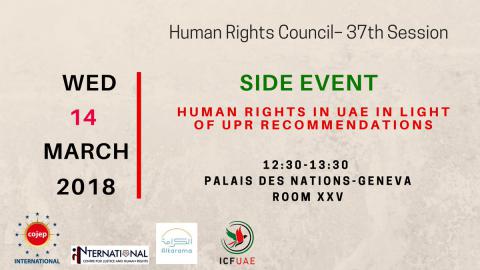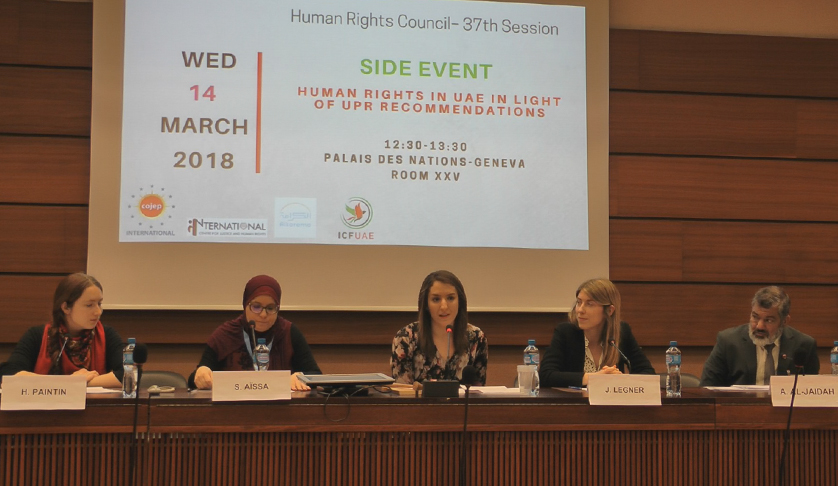
On March 14, 2018, the Alkarama Foundation participated in a side event organised by Conseil pour la Justice, l'Égalité et la Paix (COJEP) and the International Centre for Justice and Human Rights (ICJHR) at the Palais des Nations in Geneva to discuss the current human rights situation in the United Arab Emirates (UAE).
The event was organised in the context of the 37th session of the Human Rights Council, with the aim of discussing the recommendations made by the UN Human Rights Council during the 29th session of the Universal Periodic Review (UPR) on January 22, 2018.
Safwa Aïssa – ICJHR’s Executive Director – opened the discussion by highlighting the UAE’s lack of implementation of the recommendations it accepted during the previous UPR in 2013. She focused on attacks against human rights defenders, raising the cases of Ahmed Mansoor and Dr Nasser Bin Ghaith, two prominent human rights defenders arbitrarily detained in UAE prisons despite a recommendation supported by the UAE in 2013 to “[t]ake steps to protect human rights defenders […] from discrimination, harassment or intimidation”.
Continuing the discussion, Julia Legner – Regional Legal Officer for the Gulf at the Alkarama Foundation – raised the issue of the severe restrictions to the right to freedom of expression within the UAE’s domestic legislation. She also stressed the persistence of torture in the UAE, a practice used both to force confessions and as a form of punishment. The testimony given by Dr Mahmood Al-Jaidah – a Qatari national and medical doctor who was detained and tortured in the UAE – was a clear example of the brutality of this practice and of the climate of impunity in which it takes place.
Another major concern raised by Legner was the UAE’s lack of cooperation with the UN human rights mechanisms, reflected in the fact that the country has been featured in all five of the most recent reprisals reports by the United Nations Secretary-General.

Harriet Paintin – Campaigns Manager at International Campaign for Freedom in the United Arab Emirates (ICFUAE) – focused on the arbitrary detention and enforced disappearances of foreign citizens, emphasising the fact that human rights violations are not only limited to UAE citizens. Paintin highlighted the need for UAE to ratify fundamental human rights instruments including the International Covenant on Civil and Political Rights, as well as the need for UN Members States to put pressure on the UAE to abide by international human rights standards in order to protect their own citizens.
After receiving 230 recommendations submitted by 97 UN Member States during its January 2018 UPR, the UAE must inform the Human Rights Council which recommendations it will accept before the next UPR session in June 2018. The state should then implement the accepted recommendations before its fourth UPR cycle in 2022.
During the side event, the panellists highlighted the importance of raising awareness among the international community of the current human rights situation in the UAE, and keeping civil society updated on the UPR process. In particular, it is important to put pressure on the UAE to accept as many recommendations as possible and to actively implement these recommendations in order to improve the human rights situation in the country.
The panel discussion “Human rights in UAE in light of UPR recommendations” can be viewed in full here.
For more information or an interview, please contact media@alkarama.org (Dir: +41 22 734 1006).
